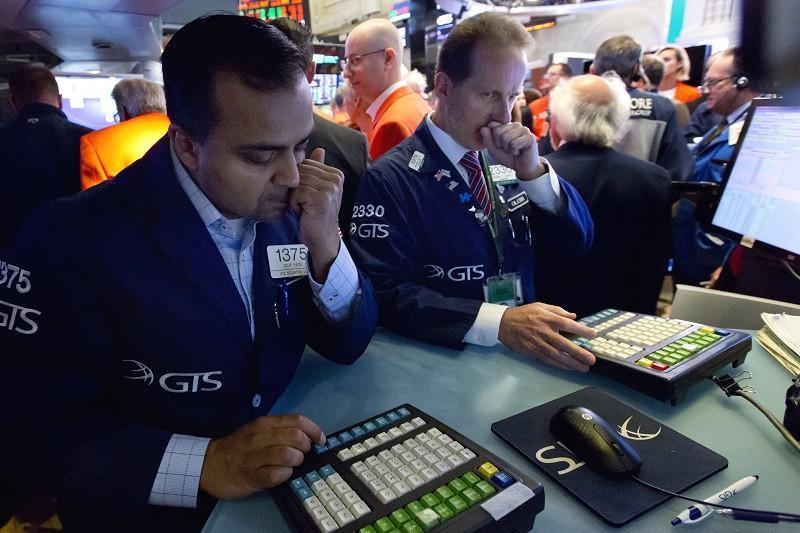
Specialist Dilip Patel, left, and Glenn Carell works at their post on the floor of the New York Stock Exchange, Friday, June 15, 2018. U.S. stocks fell with other markets around the world on Friday after the Trump administration stepped up the trade dispute between the world's two biggest economies by announcing tariffs on $50 billion of imports from China. AP Photo/Richard Drew
Tit-for-tat tariffs on products worth tens of billions have left the US and China teetering on the brink of an all-out trade war, one Beijing can ill-afford with headwinds mounting for its economy.
US President Donald Trump announced tariffs Friday on Chinese imports valued at $34 billion -- with another $16 billion under consideration -- prompting an immediate response from Beijing on American products worth the same amount.
The confrontation between the world’s two largest economies comes just as signs emerge that Beijing’s drive to cut domestic debt is taking a toll on China’s economic growth.
Economic data this week showed investment, a pillar of China’s economy, sagging, while surging exports -- threatened by the US trade spat -- have provided a boost in recent months.
China’s commerce ministry warned Trump’s tariffs "threaten China’s economic interests and security", in a statement outlining Beijing’s response.
Washington is bent on violating global trade norms, it said, and "seriously violates China’s rights and interests under World Trade Organization rules".
Trump has threatened further tariffs if Beijing retaliates, having previously said imports worth another $100 billion could be targeted.
"The trade dispute is escalating at a time when doubts about the domestic economic picture are rising," said Mark Williams, Asia Economist at Capital Economics, in a note.
Two decades ago, China’s economy was largely fuelled by exports, but it has made progress in rebalancing towards domestic investment and consumption since the global financial crisis erupted last decade -- limiting the damage trade tariffs could inflict on Beijing.
Still, strong exports this year have lifted the economy, which is now showing signs of losing steam under the weight of Beijing’s war on debt, launched to clean up financial risks and rein in borrowing-fuelled growth.
The commerce ministry issued two lists of American goods -- worth $50 billion in total -- which will be hit with a retaliatory 25 percent tariff.
Initially, 545 US products valued at $34 billion will be targeted, mimicking the tariff rollout by the Trump administration.
These include major American exports to China like soybeans, which brought in $14 billion in sales last year, and are grown in states that supported Trump during the 2016 presidential election.
Politically important exports like other agricultural products and automobiles also made the list.
"If a trade war between the two becomes fierce, the result will not provide a favourable political environment for President Trump," China’s nationalist tabloid Global Times warned in a Saturday editorial.
Beijing also drew up a second list of $16 billion in chemical and energy products to hit with new tariffs, though it did not announce a date for imposing them.
The $100 billion worth of targeted goods altogether represent a significant portion of the $636-billion two-way trade last year.
"There will be an impact on growth, in China, the US and elsewhere," said Louis Kuijs, head of Asia Economics at Oxford Economics, in a research note.
"Increased uncertainty and risks will weigh on business confidence and investment, especially cross-border investment."
Slowing credit growth has translated into lower investment, analysts say, as Chinese factories and workshops let up from their frenetic pace in May and retail sales slowed.
Fixed-asset investment during the first five months of the year flagged to its slowest pace since 1999 when data collection began, according to Bloomberg News.
Beijing’s ambitious industrial policies and state intervention, which causes much of the frustration in Washington, is holding China back, according to Capital Economics’ Williams.
"Policymakers’ reluctance to allow market forces to determine economic outcomes is eroding the advantages that have kept China an economic outperformer for so long," he said.
"China’s average growth over the coming decade is likely to be much weaker as a result."